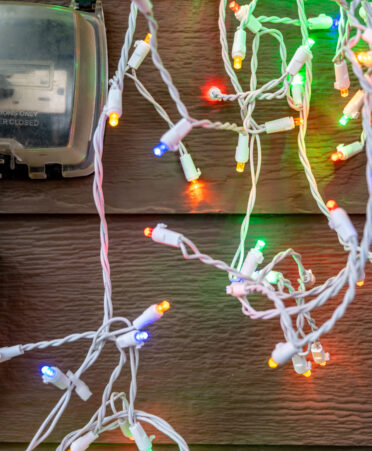(WACO, Texas) – Consumers can reduce some of the “sticker shock” when they see their electric bills in January by taking small steps in December to save money.
Hugh Whitted, an instructor in Texas State Technical College’s Solar Energy Technology and Energy Efficiency Specialist programs in Waco, said consumers should think about the kind of holiday tree being used. Real trees can dry out if not watered, which is another concern when using electric lights. Also, wrapped presents under the tree can be a fire source when lights malfunction.
“Putting any type of incandescent bulb (on a holiday tree), especially on an aluminum tree, is a recipe for disaster, and if there is a short anywhere in those lights, you will start a house fire,” he said. “Certainly, be conscious of the types of materials you are combining and using.”
Whitted said LED lights are less of a concern because they are safer to use.
“They are certainly more cost-efficient than they used to be,” he said. “They are definitely more effective as far as the amount of energy they burn.”
LED lights use 90% less electricity than incandescent lights, are cool to the touch and are shatterproof, according to information from Houston-based Reliant Energy.
Whitted advised against stringing a lot of lights together.
“If you can break them up, you are not worried as much about the current you are pulling through the lights,” he said.
Whitted said to save money, consumers should put outdoor lights on a timer with a photocell, an electric eye that senses sunlight, which will turn lights on at night. He also said a timer can be used to control indoor lights.
Reliant Energy recommends keeping indoor and outdoor holiday lights on for six hours or less a day.
Whitted said people living in older homes may experience tripped breakers and blown fuses when too many appliances and holiday lights are being used at the same time.
Whitted said when in doubt, consult with an electrician to ensure that the holiday season stays bright and merry.
According to the nonprofit, bipartisan Alliance to Save Energy, consumers should lower the temperature on their hot water heater by 10 degrees Fahrenheit before they leave home for holiday travels. Doing this can create up to 5% savings in water heating, according to the organization.
Consumers can also utilize smart light bulbs, smart plugs, smart thermostats and robotic vacuums to save energy throughout the year, according to information from Oncor.
TSTC offers a two-semester certificate of completion in Energy Efficiency Specialist, which is under the Solar Energy Technology program. Classes focus on energy rating systems, green construction, renewable energy and safety regulations.
For more information, go to tstc.edu.
